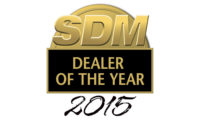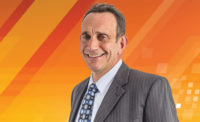Every Vector employee interviewed for the 2015 SDM Dealer of the Year story (read the full story here) referred at some point to one of the major reasons they feel Vector is so successful today: company President and CEO Pam Petrow. A prominent figure in the security industry for many years, she has been honored with multiple awards, was the driver behind the growing ASAP movement, and recently took over as president of the Central Station Alarm Association (CSAA). SDM spoke with Petrow about her history in the organization; the role she and Vector play in advancing the industry; her thoughts on what a CEO should be; and more.
SDM: How does your history with Vector inform your role as president and CEO?
Petrow:I started with Vector right out of college in 1982. My mom said, “Get moving and get a job.” A friend of the family worked here and said they were hiring salespeople, so I came in as a straight commission sales rep. I did that for a while then did inside sales and administration. When the central station manager quit, I took over the central station responsibilities and continued to take on those roles. The company has been phenomenal in allowing me to take on opportunities. I moved to DC for two and a half years and ran that branch. When I decided I wanted to start a family, I came back to Pittsburgh to be responsible for marketing, until I eventually became responsible for the monitoring centers and IT and took over as COO. I have worked pretty much in every capacity from collections on up. I think that background gives me an appreciation for the work done every day by employees and I tend to be very appreciative of that effort. I know what those struggles are. I have walked that road.
When I did my first group of town hall meetings [as president] one of the comments I made to them was, “Think about when I started here. This was a summer job to get my mom off my back. It turned into being the CEO of the company — not because I am this special person but because I worked hard and took advantage of opportunities.” I want to have that same type of organization that creates that next person that sits in the chair. We have an incredible amount of internal promotions. Those opportunities need to exist for everybody. I want everyone to know it is possible to get my job. I often offer to let them do my job for a day and clean out my inbox. But only one person has taken me up on that.
SDM: Vector as a company and you personally do a lot for the employees, even meeting with them in person for “stay interviews.” What have you learned through that process?
Petrow:This was really interesting to me. One stay interview I did last year was a service dispatcher in one of the branches. I sat down and a couple of things came out of that. I said, “Tell me one thing that frustrates you.” She said, “I don’t like saying I am a service dispatcher 2.” We thought we did something great by setting up these levels with transparency and opportunity for advancement. But we forgot the human part about how they introduce themselves to others. We called it service dispatcher 2, but to her mind she was a lead dispatcher. So we said to all the branches, “Your people’s positions need to be what they feel good about. Call it lead dispatcher if you want to.” We allowed them to use the titles that reflect what they do, but make them feel good.
Then she said, “I love the fact that you have worked here and you have done my job and been promoted. I really want to be promoted.” Yet I saw she hadn’t applied the last time a position was open. When I asked her why, she said, “I am not ready.” So I told her, “The next time there is an opportunity I want you to apply for it. You don’t have to know everything before you take it. You need to reach. You can’t sit back.” When a position for branch administrator came open, she did just that, and she got the position. Since then anytime I see her she has this big smile. A year before the stay interview she wouldn’t have applied for that. It is scary getting outside your comfort zone and we need to encourage people to do that and to train them, to provide them with the skills they don’t have.
SDM: As a female leader in the security industry, how important is it to you to foster that and other types of diversity?
Petrow:I always try to push diversity as opposed to male and female. I never personally felt Vector saw that as an obstacle. I think that diversity in the workplace is really important for a lot of reasons. We all think differently and approach things differently. When I went to Harvard we had 170 people in our graduating class and fewer than 20 females. We lived in work groups of eight. Not every apartment had a female. We found those that did were in incredibly high demand because with a mixed group, they had better diversity of responses and a better approach to problems. I also see that reflected in the business world. Having different ages, backgrounds and ethnic groups keeps “group think” out and keeps people more willing to share ideas. Whether that is male/female or the age of the team, all of that is really important if you want your company to be responsive and know what is going on in the world and not follow the same old line.
SDM: Tell SDM readers about your role in CSAA and what it means to you and to Vector.
Petrow:I strongly believe that the industry needs to be embracing new technology. We need to drive forward to stay relevant. I don’t think we can do what we have done for the last 50 years and expect not to be overtaken by new or exciting competitors. CSAA is out there promoting and educating its members. Selfishly, I think that if the industry is better, Vector will be better. I want to make sure the industry continues to have that strong voice. We can’t do it as [just] Vector. We can’t do it alone. We need the association to be the voice of the industry to make sure there are solutions for problems. Through CSAA I am able to talk to UL about what is going on with standards. I can ask how do we get the process to work more quickly to deliver products and services without being handcuffed? I think the role in CSAA is really about how we are all better if the industry is better. We are recognizing that the world is changing and I really see my role in CSAA as helping all the industry.
SDM: What is the role of a CEO, in your opinion?
Petrow:I think you need to have a different level of appreciation for the jobs people do every day. My personal belief is if I ever lose track of that, I will be less effective. When we do acquisitions and talk to owners, it is surprising how they think their business runs; then you get in there and find out how it really runs. I don’t want to be a CEO who doesn’t know how their business runs. I believe in transparency. If people understand, they are more passionate about what they do. It is how I was always treated and it made me want to do more for the company. It works for me personally and it makes me appreciate the people who get me where I am. I had a meeting yesterday with the sales team where I said, “You are my customers and I need to listen to you.” I learn from them every day and appreciate them and value them. They are what gets the work done every day. It is not about me. I have an incredible organization with a lot of talent. I just have the privilege of having my name at top of the chart.


